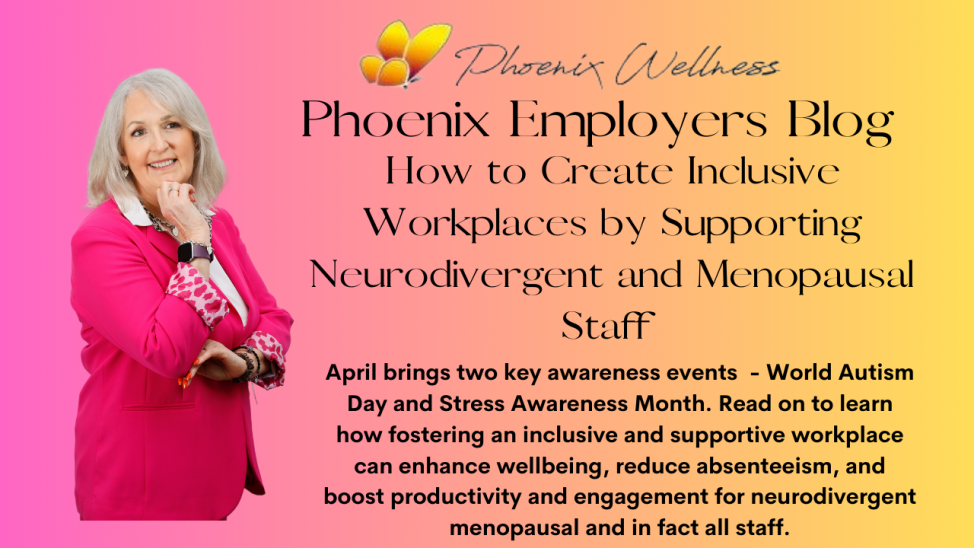
April brings two key awareness events that highlight critical workplace issues that I want to touch on in our Phoenix for Employers Blog – World Autism Day and Stress Awareness Month. These topics are particularly relevant when considering how menopause affects neurodivergent colleagues and how stress can significantly worsen menopause symptoms. By fostering an inclusive and supportive workplace, employers can enhance wellbeing, reduce absenteeism, and boost productivity and engagement – things we all want for our workplaces!
Why Menopause Impacts Neurodivergent Employees Differently

For staff living with autism, ADHD or other neurodivergence, menopause can be an even greater challenge. Many can experience heightened sensory sensitivities to light, noise or heat, executive functioning difficulties exacerbated by brain fog and increased anxiety – symptoms that are impacted by hormonal changes. This can lead to increased burnout, difficulties with focus, and greater workplace stress for these colleagues. Without adequate support, neurodivergent colleagues may struggle with retention, performance, and mental health.
The Link Between Stress & Menopause
Stress doesn’t just affect productivity – it makes menopause symptoms even harder to manage. We know that if we can reduce our stress then our menopause symptoms are often less severe. When staff feel unsupported and overwhelmed, their wellbeing declines, impacting team morale and overall business success. Research by the CIPD showed that women who felt supported at work tended to report less severe impacts of their symptoms, whilst those who did not feel supported said their symptoms increased negatively.
“84% of people who are unsupported say their menopause symptoms have a mostly negative effect on them at work compared with 71% who are supported”
Proactively addressing stress in the workplace is key to maintaining a healthy and high-performing workforce.
What Can Employers Do to Support Menopausal and Neurodivergent Staff?

- Flexible Working Options: Allow for remote work, adjusted hours, or quiet workspaces to help manage fatigue, sensory overload, and focus challenges.
- Menopause and Neurodiversity Training: Educate managers and teams to destigmatize menopause and neurodivergence in the workplace.
- Wellbeing Initiatives: Provide access to stress management programs, mindfulness sessions, and employee assistance programs (EAPs).
- Sensory-Friendly Adjustments: Ensure temperature control, noise reduction measures, and adaptable lighting to support sensory needs.
Menopause in the Workplace: Employee Experiences in 2023, CIPD https://www.cipd.org/uk/knowledge/reports/menopause-workplace-experiences/#:~:text=84%25%20of%20people%20who%20are,with%20regards%20to%20their%20menopause. - Clear Communication and Support Networks: Encourage open conversations, provide employee resource groups, and offer HR support to help employees navigate workplace challenges.
What are the Business Benefits of Supporting Menopausal and Neurodivergent Employees?
By fostering an inclusive and supportive workplace, companies can expect:
- Increased Productivity: Employees perform better when they feel comfortable and supported.
- Reduced Absenteeism: Addressing stress and menopause-related challenges leads to fewer sick days.
- Higher Retention Rates: Employees are more likely to stay in workplaces that prioritize their wellbeing.
- Stronger Employer Brand: Businesses that champion inclusivity attracts top talent and enhance their reputation.
This April let’s commit to creating a workplace where all employees –regardless of neurodivergence or stage of life – can thrive.
For More Help
If you’d like to discuss menopause and neurodiversity training or workplace wellbeing initiatives, let’s connect!
Look out for our next Phoenix for Employers Forum next month (May 2025 – date to be decided) when we’ll be discussing this important topic and sharing best practice on how to better support neurodivergent menopausal colleagues. DM or email jeanette@phoenixwellness.co.uk for more information.

